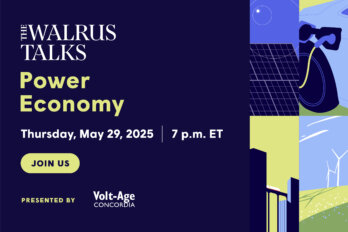Vass Bednar is the head of public policy at Delphia and she spoke about the future of consumerism from a data perspective – and that we might be a little too willing to give up our information to feel a little special.
You can watch all The Walrus Talks speakers from this event here: The Walrus Talks Consumerism on YouTube
My name is Vass Bednar, and when I made my will, I asked whether and how I could bequeath my PC Plus points and my Starbucks stars. I am so invested in these rewards programs that I actually conceptualize them as being part of my suite of assets. So what will the future of consumerism bring when my next of kin cash in?
With the rise of and growing resistance to surveillance capitalism, I think that most of us are expecting, or may be resigned to, an increasingly predictive world that anticipates your consumption choices. I get it. We’re really not all that far from Amazon sending you a box of stuff, be it with drone, autonomous vehicle, whatever, and you sending back what you think you don’t actually need. That’s just another win for big cardboard.
And maybe that doesn’t seem all that bad to you. I mean, I like things that are personalized, too. It makes me feel special and it saves me time, but if targeted ads can reduce some of that labor of shopping and make it easier and faster for me and you to spend our money and stimulate the economy, then maybe that’s not the worst thing. We all have different comfort levels with this future, and that’s okay.
But when I take a second to think about the future of consumerism or the future of consumption from a data perspective, I worry that without more sophisticated legislation around how the private sectors’ acquisition and sharing of data impacts individual consumers, we are only going to exacerbate the wild west that is the alternative or alt data market. And what do I mean by that? Digital data is most often used for advertising and retargeting. That’s our baseline, our dystopian norm, just because of how the internet was allowed to commercialize.
The information that’s used to manipulate our behaviors, to make it faster, easier, to decrease the resistance to shopping or making other decisions online, perversely comes from us. I don’t think I have to go through too many examples of targeted advertising we may have experienced online or that you may be experiencing right now, but another way that value is created is through our swipes and clicks, and these are from firms that offer the seductive and addictive reward, a promise of a reward. Rewards programs aren’t all that new historically. I get it. Thank you, air miles, also maybe goodbye air miles, but they are becoming more pervasive and sophisticated as they’ve digitized.
And what are they really rewarding their faithful members for? Our data. Many, if not most of these companies, are simply rogue data brokers selling datasets in a shady secondary market to advertisers and investors. And if they aren’t selling to secondary sources, they’re creating absolutely wild competitive advantages for themselves. For example, data on shopping habits allows companies like Loblaws to strategize for themselves exactly when to put a promotion on tomatoes and as the country’s largest grocer, they hold the data on most of our household habits, which they can then leverage against vendors who compete for premium shelf space in their stores. Now, back when we used paper coupons to save a couple bucks or a few cents, sure, we drove some anonymous foot traffic into a store. But now the data is so, so rich and detailed that they know at the granular level why, where and how products move through their stores. Who can compete with that?
For us, the consumer, cash back and rewards apps make saving money fun, like generally pretty fun, right? There’s rewards, badges, levels. I can tell my friends what I bought, but given what these private businesses are gaining from consumer data is this concept of fun, of fair trade. We have a serious supply chain problem when it comes to data in our economy and that’s partially because the Canadian data economy, their ecosystem, our ecosystem, is basically barely regulated, which is so not fun. Our federal privacy and data protection laws are 12 years old. They were drafted before the iPhone was released in Canada, but I think after the iPod, and Ontario has not revised its largely unenforced consumer reporting legislation in something like 40 years.
Not all regulators are asleep at the wheel when it comes to this. Over in California, legislators are leading the way when it comes to policy options. The state recently proposed a bill to create a public registry of data brokers. How cool is that? I think it’s pretty cool. I got excited. The legislation began as an effort to help consumers exercise their rights under the California Consumer Privacy Act, including the right to opt out of the sale of their personal information. I actually called Ontario Consumer Protection to ask them what recourse I’d have if I found out that this Tetris app was reading all my text messages and tracking my location without me opting into that and they confirmed absolutely nothing.
We are somehow at a point where we’re comfortable with the platforms that offer us apps, applications, mobile applications, kind of self-regulating, right? We look to Google Play or the App Store. That’s not going to be enough. Over in Europe, the third party data ecosystem is actually starting to implode. Upcoming European data privacy rules restricting the use of cookies means that companies can no longer track prospective customers across the web.
Implications for retailers? Perhaps, but I think we also have to ask what data we need and what data is just nice to have. It absolutely seems insane to me and many others and hopefully you, that the data-driven economy fundamentally disadvantages the individuals that it relies on to provide the data that drives it. And sure, value can be added to these datasets when it’s processed by a particular company or firm or platform. But when what we can also be talking about is the buying and selling of those datasets, give me a break.
To recap, most reward programs today are basically data selling scams. A digital generation that is increasingly squeezed may be the most vulnerable to using these apps, right? What else? Maybe we’re on the brink of a recession. Saving money, receiving rewards may become more tempting, lucrative, and competitive than ever before. At what cost? Without a reality check, loyalty programs are purely predatory. The greatest reward we can hope for in the future is a regulatory system … get excited … that balances the reward to private businesses and consumers.
For now, what can I advise you to do? Unfortunately, it’s just to read the fine print and enter into these relationships with eyes wide open and when the opportunity arises, because I think we know that as Canadians, these good ideas will spill over or trickle down or up, they’ll get imported here, whatever phrase we’d like to use, participate in these really important policy conversations that can bring data supply chains out of the shadows. Thank you.




